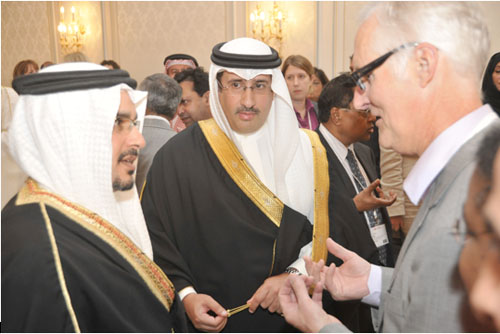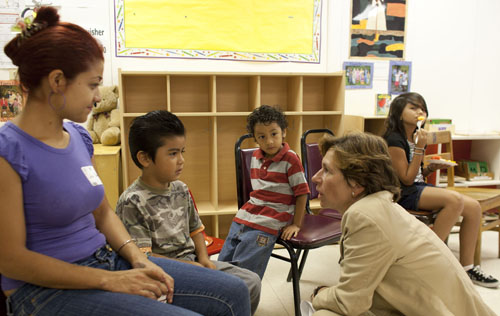
Múlt csütörtökön, I attended a dazzling gala to watch special education teacher Matthew Cunningham accept the inaugural GEMS Education Chicago Teacher Award. And yesterday, I listened as Andreas Schleicher presented the key findings from the 2013 OECD Tanítás és tanulás International Survey (NAGY).
In the context of Education Fast Forward (EHA) Debate 10, “Better Teaching for Better Learning: Results of the OECD Teaching and Learning International Survey (NAGY),” which followed, Lord David Puttnam reminded us all that change is painful. As a young aspiring tennis player with a forehand that needed re-invention, he had learned that lesson the hard way during the 1st round of Junior Wimbledon when it was too late for change.
Change in education has historically taken time, but in an age of innovation when technology is impacting every aspect of our daily lives at a tremendous pace, it is vital to understand the day to day issues faced by teachers globally and move rapidly from a policy standpoint to bring about the changes they need to improve student outcomes.
I asked Michael Fullan, Lord Jim Knight and Pasi Sahlberg to share their perspectives after the Education Fast Forward (EHA) Debate 10.
Gentlemen, did the TALIS study ask all the right questions?
Pasi Sahlberg: I think overall, TALIS provides important and interesting comparable insights into the teaching profession around the world. Did TALIS ask ALL the right questions? I think this is a question that probably will divide opinions. My own burning question that TALIS doesn’t shed light on is how the rapidly growing Teach for All movement is affecting teachers and their work, especially in countries that are seeing many of their new teachers coming from these fast-track teacher prep programs. Another theme that remains quite silent in this survey is how significant leadership is in making schools work well. TALIS focused primarily on teachers and much less so on school leaders.
Michael Fullan: A TALIS vizsgálat értékes, hogy létrehoz egy erős vita a jelenlegi állapot a tanári. Ez kevésnek bizonyult, mert keletkezett, amit én "Veszélyes féligazságok’ – megállapításait, hogy megvan a maga érdeme, de hiányos, mert könnyen félre lehet értelmezni, és így azok felületes vagy káros politikák. Például, a megállapítással, hogy tanári értékelési / feedback vezethet pozitív változás osztálytermi gyakorlatban nem határozza meg, hogy milyen feltételek mellett ez lenne igaz, (igaz, ha van egy együttműködési és növekedés-orientált kultúra; false if there is a punitive carrot and stick culture). The same problem affects the other big factor examined, Professional Development, which again only is effective when it contains strong pedagogical content and is integrated into the school improvement plans of school leaders and teachers working together.
Lord Jim Knight: Broadly speaking, igen, the study did ask all the right questions. It is always possible to quibble but it remains very insightful for secondary schools. I would have loved to see elementary school data to make a comparison.
What was the most important take home for you?
Pasi Sahlberg: I think the most interesting take-away for me is teachers’ views of the way society values the teaching profession and how wide the gap is between the countries where teachers feel they are valued and where they feel they are not. It is alarming to me that in France, Sweden and Spain, less than one of ten teachers feels valued. This suggests that it is not just more professional development or more pay that will change this dangerous trend, but more fundamental change in the role of how teachers are treated is needed.
Michael Fullan: The most important take away was the consistency of findings throughout the report that showed that teacher efficacy and job satisfaction were strongest when teachers work together, and principals work as instructional leaders helping teachers work in collaborative focused ways on the student learning agenda. Sajnos, these findings tend to be underplayed because of the focus on appraisal and professional development. Not enough was made of the more powerful conclusion that improvement happens more deeply and more quickly when school leaders and teachers work together in focused ways on improving learning and achievement.
Lord Jim Knight: The most important take away is the importance of collaboration and feedback to drive development.
What are the key things we need to do to improve the teaching profession?
Pasi Sahlberg: If teachers are to engage in professional development, collaborative school improvement and pedagogical reflection in their work, as TALIS shows successful education systems do, changes in teachers’ working conditions must take place. Egyes országokban, tanárok’ work loads before professional development and collaboration in school are so big that, in most cases, they don’t have time and energy to do anything else. One thing that should improve is better teacher policies in national education strategies. Ez magában annyi, hogyan felkészítést kapnak, mint hogy hogyan kell segíteni és támogatni a munkájukat. Meg kell gondolni, hogy a tanítás egyszerű, ezért bárki, hogy egy tanár. Ehelyett meg kell gondolni, hogy a tanítás nem rakéta tudomány, sokkal bonyolultabb, mint az.
Michael Fullan: Meg kell állítanunk számít ilyen nagymértékben függ tanári értékelési alapján sárgarépa és a bot, és helyette építeni a szakmába i) fókuszált belüli iskolai együttműködéseket; ii) fókuszált iskolák közötti tanulási; iii) szabványok diákok, teachers and school leaders that are developmental driven; iv) transparency of practice and results; and v) generally involving the profession in developing solutions that affect all teachers. The TALIS report skirted around the key dilemma of moving from negative accountability to accountability driven by the group in relation to external requirements.
Lord Jim Knight: We need to incentivise teachers so that they use collaboration in an inventive way versus a mandated way. Tanárok kell azt a jogot, hogy több időt a szakmai fejlődés.
Többet EFF Vita 10 köztük Andreas Schleicher előadása.
Michael Fullan a szerzője számos könyv oktatás és a társszerzője Szakmai Capital: Átalakuló tanítás minden iskolában. Lord Jim Knight ügyvezető igazgatója TSL Oktatás, A legnagyobb hálózat a tanárok a világ. Pasi Sahlberg a szerzője Finn Lessons: Mit tehet a világ Tanulj Oktatási változása Finnországban?


Fénykép ég jelenet jóvoltából GEMS Education
A globális keresési Oktatási, velem és világszerte elismert szellemi vezetők többek között Sir Michael Barber (UK), DR. Michael blokk (Az US), DR. Leon Botstein (Az US), Professzor Clay Christensen (Az US), DR. Linda Darling-Hammond (Az US), DR. Madhav Chavan (India), Professzor Michael Fullan (Kanada), Professzor Howard Gardner (Az US), Professzor Andy Hargreaves (Az US), Professzor Yvonne Hellman (Hollandiában), Professzor Kristin Helstad (Norvégia), Jean Hendrickson (Az US), Professzor Rose Hipkins (Új-Zéland), Professzor Cornelia Hoogland (Kanada), Tisztelt Jeff Johnson (Kanada), Mrs. Chantal Kaufmann (Belgium), DR. Eija Kauppinen (Finnország), Államtitkár Tapio Kosunen (Finnország), Professzor Dominique Lafontaine (Belgium), Professor Hugh Lauder (UK), Professor Ben Levin (Kanada), Lord Ken Macdonald (UK), Professzor Barry McGaw (Ausztrália), Shiv Nadar (India), Professzor R. Natarajan (India), DR. PAK NG (Szingapúr), DR. Denise Pope (US), Sridhar Rajagopalan (India), DR. Diane Ravitch (Az US), Richard Wilson Riley (Az US), Sir Ken Robinson (UK), Professzor Pasi Sahlberg (Finnország), Professzor Manabu Sato (Japán), Andreas Schleicher (PISA, OECD), DR. Anthony Seldon (UK), DR. David Shaffer (Az US), DR. Kirsten Magával ragadó Are (Norvégia), Chancellor Stephen Spahn (Az US), Yves Theze (Lycee Francais-beli), Professor Charles Ungerleider (Kanada), Professzor Tony Wagner (Az US), Sir David Watson (UK), Professzor Dylan Wiliam (UK), DR. Mark Wormald (UK), Professzor Theo Wubbels (Hollandiában), Professzor Michael Young (UK), és professzor Minxuan Zhang (Kína) mivel azok feltárása a nagy kép oktatási kérdés, hogy minden nemzet ma szembesül.
A Global Search Oktatási közösségi oldal
C. M. Rubin a szerző két legolvasottabb internetes sorozat, amely megkapta a 2011 Upton Sinclair díjat, “A Global Search for Education” és “Hogyan fogjuk olvasása?” Ő a szerzője a három bestseller könyv, Beleértve The Real Alice Csodaországban, a kiadó CMRubinWorld, és egy Disruptor Alapítvány ösztöndíjasa.
Kövesse C. M. Rubin on Twitter: www.twitter.com/@cmrubinworld






Legutóbbi hozzászólások